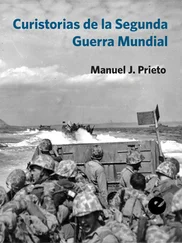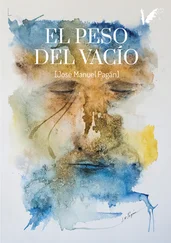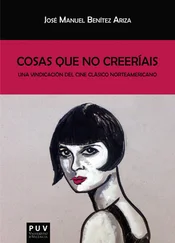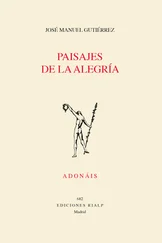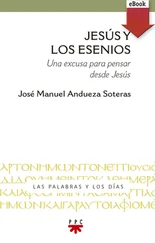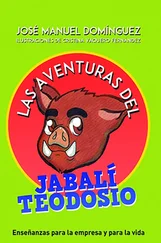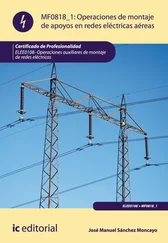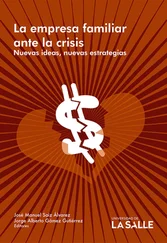“Or wherever. To leave Russia.”
“Kolia told me he’d like to go into the forest and never return. A day like today, with a HARD FROST, so that the snow covers his tracks. He’s been talking about this all morning. He says he would lie down on a fallen cedar and let himself die of the cold, you know? Like those poor BRODIAGAS we saw in the south. He also told me that when people leave the north they carry the bodies of their dead away with them. The permaFROST keeps them intact.”
“Wait,” LINDA interrupted me, visibly upset. She stood up, almost knocking the chair over. “I’ll bring you some water.”
Five minutes later I heard a car engine roar to life beneath the window. It was true: she was going to New York. By way of good-bye she’d said, “Wait,” clearly in the sense of my own summer sermons. I wept. I’m not ashamed to confess it. Tears rolled down my cheeks, uncontrollably. (Then, on the chair, I found a little bit of the LIGHT OF OTHER DAYS, the video of our fateful CATWALK.)
When we switched on the TV the next morning we learned of the fall of the IMPERIUM. I felt no emotion whatsoever. I merely noted that Mikhail Sergeyevich, the last emperor, had sent us a message that was full of meaning (apparently he, too, was in on the secret of FLUORIDE). The following is, undoubtedly, a fact of general interest, and I mention it here so that it may pass into history: The last emperor met with a rock band (a very bad one, the Scorpions) hours before reading his resignation speech on television. A most astute gesture on his part, no doubt.
In essence, this had been a time as old as any other. (Darius, king of the Persians; Chang Hua, the first Chinese ENCYCLOPEDIST; the Russian explorer Афанáсий Ник  тин [Afanasy Nikitin] who made the long journey to India in 1466.)
тин [Afanasy Nikitin] who made the long journey to India in 1466.)
VERSE. In Russia they do write blank VERSE, as well, composed for declamation as a litany, the singular emotion of a monotonous buzz in the ears. Nevertheless, people on the street will acknowledge only what rhymes, and everyone knows long sequences of VERSE by heart. A young female trolley conductor whom I took back to my room one night with very clear intentions stood on the bed and declaimed the reasons for her refusal of me, which were taken from a long poem by Т  тчев (Tyutchev). Dumbstruck, I desisted from my endeavor, for I could not oppose a woman who contained so much poetry. When at last, exhausted and out of breath (we’d ingested a good deal of AQUA VITAE), she went to the bathroom to take her clothes off, I already had another subject for an indispensible book: “Moscovy for Beginners.” Declaiming long stanzas of rhyming VERSE is nothing, don’t be impressed; it’s a juggler’s art, the same sort of popular erudition as a knowledge of many different dance steps would be for other more immediate peoples whose vision is less permeated by literary culture. Essentially, my trolley conductor, the nurse who took care of a friend, the gentleman who read me his deplorable VERSE for five full Metro stops, or the BRODIAGA I saw in an underground passageway trying out cadences and rhymes with movements of his head — when I asked him as I went by if he was writing VERSE, I turned out to be correct: he read me the one he’d just composed (heavy spikes of wheat, white birch trees) and offered to write me two salutatory stanzas at fifteen rubles per word — essentially, all these VERSIFIERS were, in the end, very elementary, uninformed, crude, whatever else you like.
тчев (Tyutchev). Dumbstruck, I desisted from my endeavor, for I could not oppose a woman who contained so much poetry. When at last, exhausted and out of breath (we’d ingested a good deal of AQUA VITAE), she went to the bathroom to take her clothes off, I already had another subject for an indispensible book: “Moscovy for Beginners.” Declaiming long stanzas of rhyming VERSE is nothing, don’t be impressed; it’s a juggler’s art, the same sort of popular erudition as a knowledge of many different dance steps would be for other more immediate peoples whose vision is less permeated by literary culture. Essentially, my trolley conductor, the nurse who took care of a friend, the gentleman who read me his deplorable VERSE for five full Metro stops, or the BRODIAGA I saw in an underground passageway trying out cadences and rhymes with movements of his head — when I asked him as I went by if he was writing VERSE, I turned out to be correct: he read me the one he’d just composed (heavy spikes of wheat, white birch trees) and offered to write me two salutatory stanzas at fifteen rubles per word — essentially, all these VERSIFIERS were, in the end, very elementary, uninformed, crude, whatever else you like.
VILLAGE (see: AGRICULTURE).
WHEN ME YOU FLY, I AM THE WINGS (SI HUYES DE Mí YO SOY LAS ALAS — EMERSON). Someone, a woman you met in a pension in YALTA, an inconsequential summer romance, suddenly initiates a correspondence and the very first letter leaves you disconcerted by her refined mastery of the epistolary art.
In Russia, words retain a force that has been lost in the OCCIDENT. I’ve received letters that could be published without the addition of a single comma, and yet which I knew to have been written in a frenzy of jealousy, in a single sitting, at a kitchen table amid pots of jam. A kitchen I imagined perfectly: the house lost in the immensity of the Grand Duchy of Muscovy, the point thousands of kilometers distant to which her astral existence had displaced her and from where she was sending me these letters like radiograms containing her coordinates, the chronicle of her very dull life: the hated husband, the fearful gloom of the world outside. The fortuitous intersection of our orbits in that pension in YALTA had activated all her reserve systems — which had been awaiting the signal of an embrace for years — and now she was sending me detailed reports on all her functions: “You won’t believe me, but I haven’t stopped thinking of you since that night we spent at the lookout. My heart. .” Nineteenth-century formulae that retain all their power in Russian, a language well suited to descriptions of delicate states of being such as nostalgia, the absence of a beloved, the unbearable sorrow of a rupture. A system of categories that slammed into me with the crushing force of a sudden crash to the ground after slipping on a banana peel. In her letters I found fresh ideas, truths I myself had taken a very long time to discover, and her citations evinced an intimate mastery of such topics as music, sculpture, and the arts in general. (I’d had a friend, E**, who would sometimes speak to me in perfectly calibrated verse, stringing together miraculous improvisations on whatever it was she wanted to say to me at the moment: “Take the teapot from the fire, would you be so kind?” “Do me the favor of toasting up a slice of that nice bread!” and “Don’t you agree we should make the most of the sunshine and go out for a stroll?” and so forth. To receive three perfect letters from this woman, letters I’ve kept all these years, barely surprised me at all, for it was clear that her breast harbored great quantities of literature in the rough. But the truly curious thing was that I’d also received admirably well-written letters from simple bookkeepers, nurses, attendants at child-care facilities. All of them exceptionally skilled at dashing off five handwritten pages, the complete naturalness of the epistolary novel, a genre I’d always thought of as rather too clever, somewhat forced.)
I’d picked up this letter at the porter’s lodge as I was on my way out to an appointment. In the café, I asked K** to give me a second, tore open the envelope, and began reading. The woman described our visit to the lookout the evening before my departure and asked if I still loved her, if I remembered the starling chirping in the hedge that woke us in the morning. Her letter contained such tenderness, such promises of eternal fidelity, such certainty that I’d been desperately needed during the days since we’d last seen each other, that for a second I weighed the possibility of taking a plane, traveling 5,000 kilometers, and living with her for a while in her log cabin, lighting the woodstove in late afternoon, shoveling snow from the doorstep. Hurriedly I began my response on a paper napkin, “As you can see, I haven’t even waited to get home before answering your letter.” But when I raised my eyes to find the right word, the turn of phrase that would say precisely what I felt, I encountered the astonishment on K**’s face and my plan vanished in an instant. What sense would it make to travel so far when I have a woman right here within reach, et cetera ?
WONDER, STEVIE: THE SECRET LIFE OF PLANTS. Through my capillaries ran the sap of a hundred thousand melodies, green globules that sometimes passed through the alkaline barrier of the cell walls and burst forth upon my lips in the form of song. Many of these particle-songs had names that were incapable today of reactivating the nervous centers of those intense sessions of listening—“BOOGIE SHOES,” “THE SECRET LIFE OF PLANTS”—now more or less forgotten but that, during my adolescence, had been the key to deciphering the messages of truth we receive from the world’s RADIO broadcast centers. At night, immobile in the penumbra of my room, I twirled the receiver’s dial tirelessly until the galvanic discharge of That’s the way, oh-hoh, un-huh, I like it, oh-hoh, un-huh, came pouring through, and I would shake my leg like a frog in an experiment, kicking out reflexively in response to the electric shock, and raise my head, eyes full of life. I should have explained all of this to LINDA.
Читать дальше
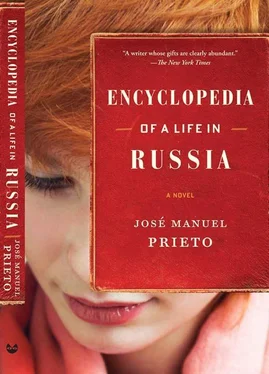
 тин [Afanasy Nikitin] who made the long journey to India in 1466.)
тин [Afanasy Nikitin] who made the long journey to India in 1466.) тчев (Tyutchev). Dumbstruck, I desisted from my endeavor, for I could not oppose a woman who contained so much poetry. When at last, exhausted and out of breath (we’d ingested a good deal of AQUA VITAE), she went to the bathroom to take her clothes off, I already had another subject for an indispensible book: “Moscovy for Beginners.” Declaiming long stanzas of rhyming VERSE is nothing, don’t be impressed; it’s a juggler’s art, the same sort of popular erudition as a knowledge of many different dance steps would be for other more immediate peoples whose vision is less permeated by literary culture. Essentially, my trolley conductor, the nurse who took care of a friend, the gentleman who read me his deplorable VERSE for five full Metro stops, or the BRODIAGA I saw in an underground passageway trying out cadences and rhymes with movements of his head — when I asked him as I went by if he was writing VERSE, I turned out to be correct: he read me the one he’d just composed (heavy spikes of wheat, white birch trees) and offered to write me two salutatory stanzas at fifteen rubles per word — essentially, all these VERSIFIERS were, in the end, very elementary, uninformed, crude, whatever else you like.
тчев (Tyutchev). Dumbstruck, I desisted from my endeavor, for I could not oppose a woman who contained so much poetry. When at last, exhausted and out of breath (we’d ingested a good deal of AQUA VITAE), she went to the bathroom to take her clothes off, I already had another subject for an indispensible book: “Moscovy for Beginners.” Declaiming long stanzas of rhyming VERSE is nothing, don’t be impressed; it’s a juggler’s art, the same sort of popular erudition as a knowledge of many different dance steps would be for other more immediate peoples whose vision is less permeated by literary culture. Essentially, my trolley conductor, the nurse who took care of a friend, the gentleman who read me his deplorable VERSE for five full Metro stops, or the BRODIAGA I saw in an underground passageway trying out cadences and rhymes with movements of his head — when I asked him as I went by if he was writing VERSE, I turned out to be correct: he read me the one he’d just composed (heavy spikes of wheat, white birch trees) and offered to write me two salutatory stanzas at fifteen rubles per word — essentially, all these VERSIFIERS were, in the end, very elementary, uninformed, crude, whatever else you like.
